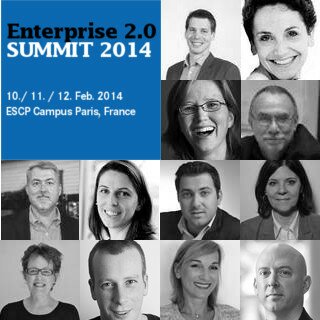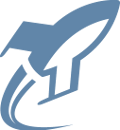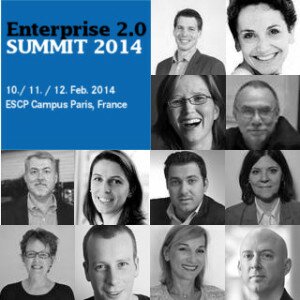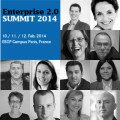In a discussion with Rogier earlier this week I had to realize that though we are talking now about the Enterprise 2.0 SUMMIT nearly on every corner of our “ ” – I have not yet really achieved to make clear the idea and the core story of this year’s conference. So in order to give you a better feeling of the conference beyond the list of speakers and beyond the list of contributing case studies I will try to formulate the big idea about the 2014 edition of the Enterprise 2.0 SUMMIT in this post.
 Preambling to the ideas and the content of the different tracks of the conference I like to say that our philosophy in doing conferences at Kongress Media is to provide always a coherent editorial structure for our conferences. We are not choosing electively just some speakers or prominent case studies but always try to select people that can contribute something to the big idea of the specific edition of the conference.
Preambling to the ideas and the content of the different tracks of the conference I like to say that our philosophy in doing conferences at Kongress Media is to provide always a coherent editorial structure for our conferences. We are not choosing electively just some speakers or prominent case studies but always try to select people that can contribute something to the big idea of the specific edition of the conference.
In this context it is also always challenging to fit in the expectations of our sponsoring partners – as they naturally are more in preference to the topics and people that fit to their marketing agenda then to our ideas about the content. Because the topics of the sponsoring partners are always technology driven and our contents are project driven – not always on track with the technology topics. But so far – it always worked out fairly and I am very grateful to the continous support of some sponsoring partners like IBM France, blueKiwi/Atos or XWiki but also to our new sponsoring partners of this year – as there are Jive Software, SAP and NewsGator!
The big idea of #e20s 2014: Getting Social Enterprise Ready!
Getting down to the topics of the 2014 edition of the Enterprise 2.0 SUMMIT – it’s all about giving insights and advices on how to drive the different types of projects forward towards a strategic impact on the enterprise!
So the big idea of this year’s conference is about how to drive the project. This said we are trying to get to an even more detailled level of discussion – as the years before. The conference is therefore not about discussing a generally needed paradigm shift for the future of work and the collaborative organisation – but about the actions to be taken to drive the adoption of collaborative environment,the cultural shift on the individual, group and organizational level, and the future design of the organization. These actions are to be discussed from two different perspectives – from the practical perspective of case studies that is based on historical lessons-learned in a non-interference-free environment (this is what we call our Practice Panel) and the imperative perspective of expert’s recommendations (this what we call our Expertise Panel). So while the “Practice Sessions” is always discussing a mix of actions, the “Expertise Sessions” is focussing on some specific actions.
As the project excellence for “social” is very much depended on experience based knowledge some additional “Interactive Sessions” will provide the opportunity to apply the gained knowledge in a interactive learning situation.
The #e20s Practice Session share lessons learned in the context of different business objectives
This year’s case study discussions are structured along the focussed support of some specific business objectives (as this is also one of my leading expectations for 2014′s discussion!). Certainly “social initiatives” always support more than one business objective but the key entry point of the project relates to some specific direction of impact. At #e20s 2014 we are distinguishing the enablement of the overall strategic development of the company, the enablement of improvements for the performance, the process, the output/quality or the innovation, and the enablement of change for some specific corporate behavior. For each of this direction of impact we have a session with 2-3 case studies to tell their story. (See the “blue colored” session on the schedule overview!)
And – to meet the right expectation: Each of the invited case study is not yet a true “Enterprise 2.0/Social Enterprise” but a company that is involved in initiatives that are leading towards the vision of this! Some of them have a more holistic approach than others, but each of them have a specific story to tell. By “holistic” I mean the scope of the project – whether it is already on an enterprise-wide or still on the departmental scope.
As a side remark to this – I like to relate back again to my post on the different project types I have found in my research for the conference.
The story of each companies like Bosch, Solvay, L’Oreal, La Farge, ING and others consists always of their motivation for the project, their actions and approaches to the project, their achieved results so far and the lessons-learned for the project management.
The #e20s Expertise Sessions try to support the professionalism of the project management approach
Besides the six sessions on case studies the conference includes “Keynotes” and “Expertise Sessions” on specific issues of the project management.
The keynotes at the beginning and the end provide the overall bracket to the conference. The opening “bracket” discusses the need of actions that improve the business performance – with a more practical approach from Dan Pontrefact (TELUS) and an expert view by Jon Mell (IBM).
The closing “bracket” tries to draw a conclusion for the conference on how to evolve the organization on the level of a new kind of organization and provides insights and recommendations for a strategical framework – with Dion Hinchcliffe (Dachis) and Peter Vander Auwera (Corporate Rebels United) speaking.
Inbetween we have four “Expertise Sessions” with each two specific talks and an discussion on four specific issues for the project management: the issue of the successful engagement and adoption management, the issue of the successul change management, the issue of the alignment of “social” to the given process organisation (for stage one in the evolution of social), and the issue of designing an effective future model for the organization and the management (for stage two in the evolution of social).
Additional to this we have two more “Expertise Discussions” with some nice set of discussion panelist and with some empirical results (as introduction) from the E&Y research (presented by E. Quintarelli for the discussion on how to evolve the social initiative towards an strategic approach!), from Jane McConnell and her “Digital Workplace Trend Research” and from Michel Ezran (LECKO) on their market research on social technology – both as introduction for the discussion of the future of the digital workplace.
Each of these session will get some specific questions to be answered during the session in order to produce some real recommendations on how to advance the project management.The #e20 Interactive Sessions support the application of the gained knowledge
Additional and optional the conference provides some even more interactive parts that are meant to support the application of the gained knowledge.
First to mention on this is the LEGO Serious Play that is generously facilitated by Avea Partners. Within this limited sessions (only for 20 people) the participants will build together two “landscapes”. In the first session the task is to create the landscape of challenges and issues for the project management – the second session (at the end of the conference) is about the solution approaches to this.
The second interactive session is a World-Café-alike styled session on again some specific aspects of the project management: the “User Training & Skill Management”, the “Seeding & Piloting Strategies”, the “Change Communications”, the “Project Measurement & Analytics”, and the “Project Governance”, These topics will be facilitated at five different tables with one or two experts giving a short 3-5mins introduction to the topic and a 15mins discussion with the participants of the table. After 20min there is a break and change of tables. Within the given time of the session people can participate at three different roundtables of their choice.
Last but not least – we will again organize a Hackathon session on the second day for which we will have competing teams working on specific business scenarios to develop a project approach and strategy for a given business problem. So this is the part when the attendees can really apply their gained knowledge of the conference. The outcome of this session has to be pitched to the entire audience at the end of the conference.
#e20s is more than a nice list of speakers and case studies
I hope I made clear that the idea of the Enterprise 2.0 SUMMIT goes beyond the presentation of some well-known speakers. Actually rather than choosing our speakers by their presentation track record we have choosen speakers (especially from the corporate field) that we really had to convince to present their case studies.
In regards to the case studies we put again an emphasize on the diversity of case studies – in relation to the size of the company and the cultural background (France, Germany, Scandinavia, Canada, and Italy). Some of the French case studies will even be presented in French this year – with a translation service being provided!
So – I hope I made clear what we are up to for the Enterprise 2.0 SUMMIT 2014, why we think this edition will become a blast and that I provided you with sufficient reason to take part in this year’s conference! Looking forward to discuss this approach and to meet you at the conference!












9 thoughts on “Enterprise 2.0 SUMMIT 2014 – what is it all about?”